Hi all, I’ve had some difficulty posting on the blog so I’ve been documenting on Word. I’ll post everything here now and will try to keep it in chronological order as much as possible.
When every single moment is a new experience, the passage of time feels quite different.
On my arrival in Accra, I was met by my uncle and aunt at the airport and spent the first couple of days at my uncle’s house. I am so fortunate to have all my extended family here in Accra – I don’t get to see them enough so it was nice catching up.
I made the journey from Accra up to Ankaase accompanied by my aunt in her work car. It is a 4 – 5 hour journey up north from Accra to Kumasi (the second largest city in Ghana). Ankaase is located a few miles north of Kumasi. Unfortunately, the town is not charted on google maps (at least not yet, a request has been made to rectify that!)
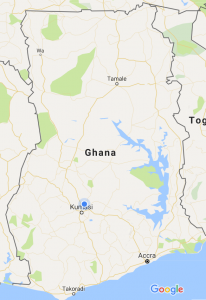
Arriving in Ankaase, I hadn’t known what to expect. I had no idea quite how rural it would be! First thing you notice is the dust. It is currently the dry Harmattan season which cakes everything with dust. Here it is a reddish clay like color that sticks to everything. (Harmattan are the trade winds that blow in from the Sahara Desert over West Africa into the Gulf of Guinea from November to March)
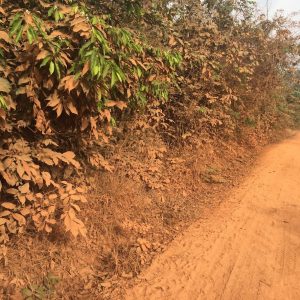
Ankaase is a small rural village of I think of about 15,000 people or so. People here are very poor and subsist on petty trade and small scale farming. The hospital – Methodist Faith Healing Hospital (MFHH) is owned by the Methodist church and partially government sponsored. The hospital was founded by Dr Cameron Gongwer, an American family medicine physician who lived in Ghana with his family for 12 years. He planted a seed as a small hole in the wall clinic that has since sprouted into a bustling multi-functional hospital.
Everybody here is so welcoming! Akwaaba is Twi for “you are welcome” this is a phrase you will hear whenever being introduced to anybody. The accommodations are quite decent. I literally have a whole suite to myself. It is the old guest house behind the main house where Dr Gongwer used to live. About a 10 minute walk to the hospital. Another team from Virginia Commonwealth University arrived about a week after I did and are staying in the main house with Emmanuel “Manny” Otsin. Manny has been the one primarily corrdinating the activities of us visiting phycisians and students has been invaluable to this experience here so far. He trained in the US as an ED nurse and has been volunteering at the hospital for the past year. He has many incredible stories about his experiences so far. You can follow his adventures at: anidasowoha.blogspot.com
Pictures of Ankaase Methodist Faith Healing Hospital:
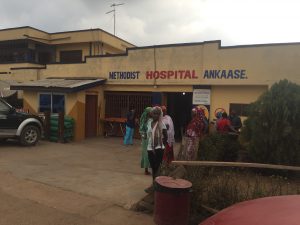
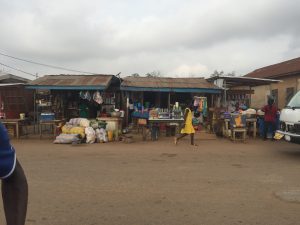
The main market is directly across the street
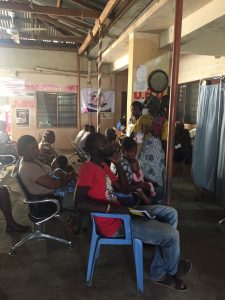
Healthcare is drastically different here. I am learning so much! Challenges abound with the resource limitations here, it is disheartening at times. However, people make the most of what they have. The hospital sees upwards of 300 patients a day in the outpatient department alone. There is an 81 bed inpatient facility including maternity, surgical, medical and pediatric units and a small but very busy emergency/casualty unit. There’s a lab (for basics like bmp, cbc, malaria parasite screens, CD4 counts) an ancient analogue xray machine (but it works!), ultrasonography, psychiatry, physiotherapy, pharmacy, ENT, optometry, and a public health department. For this being a rural district hospital, there is an impressive diverse array of services provided for the patients and it is deeply entrenched in the community.
The language barrier is a challenge for me so I’m working closely with the medical officers here.
The outpatient department (OPD) works on a first come first serve basis. There are no appointments. No schedules. Patients arrive early in the morning and sit and wait for however long it takes until they are seen by the doctor. There are about 4 consulting rooms – some have 2 providers in one room. Patients come in continuously one after another after another until they’re all seen…
Malaria is endemic here and is one of the most common diagnoses I’ve come across. It’s on the differential for almost every presenting complaint – sometimes treated empirically, regardless of whether malaria parasites are found on blood smear. There’s also infectious gastroenteritis, enteric fever (typhoid fever) – these are treated with broad spectrum antibiotics to cover all possible etiologies. Peptic ulcer disease and gastritis have also been common (Interesting. I’ve learned this has to do with certain aspects of the diet and habits such as fasting for long periods of time…) Chronic Hepatitis B and HIV are also quite common. Most surprising to me though is the chronic conditions that are so prevalent here – hypertension, diabetes, asthma – my bread and butter in clinic in the US! Here, patients present in extremis sometimes. They present to the ED in hypertensive emergencies with stroke, paralysis, heart attacks… uncontrolled diabetes presenting in DKA. Medication compliance , financial/poverty issues, cultural beliefs all combine to make controlling these conditions a challenge. Patients needing specialty or tertiary care are referred to the main teaching hospital in the city of Kumasi about 45 minutes away. Patients may often refuse to go because they would not be able to afford the treatment provided. Refusal of treatment due to lack of funds is frustratingly common. Poverty as the main determinant of health is very evident here…
